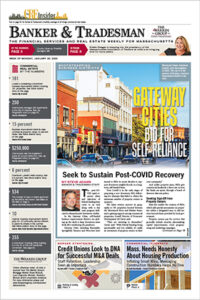As concerns rise about worker and business retention, economic development, and affordability in Massachusetts, Jay Ash and Massachusetts Competitive Partnership are focused on understanding where there could be room for improvement.
Ash has been on and around Beacon Hill for decades. After serving as secretary of housing and economic development under former Gov. Charlie Baker, Ash is now the president and CEO of MACP, where he works with Massachusetts businesses and their CEOs on workforce development and economic competitiveness. Ash will round out his sixth year with MACP at the end of 2024, a milestone he’s achieved all while amassing a significant social media following (and highlighting frappe-related content).
In a conversation with the State House News Service, Ash spoke about how he and MACP are thinking about economic patterns, his observations of the Legislature over time, and what “competitiveness” means to him.
This interview has been edited and condensed for clarity.
Q: There’s always a lot of talk about the future of the state’s economy. But recently, as we’re seeing these reports come out about housing and affordability, the exodus of young people, and concerns about the workforce, what kind of conversations are you having with the business leaders and what stands out to you the most?
A: We’re very concerned about the competitiveness of the Massachusetts economy and we’re trying to set the alarms on that. There’s evidence to suggest that our economy is not rebounding from the pandemic the way that other economies around the country have. There’s evidence to suggest that everything that we’ve taken for granted relative to our economy in the past we should no longer be feeling comfortable about. The one data point that I use to illustrate this is MACP research, [which] would suggest that Massachusetts has recovered all of the jobs we lost during the pandemic, plus we’ve added 32,000 more. That sounds like reason to celebrate — you’ve recovered everything you lost, plus you’ve added more. Until you take into consideration that Texas has recovered all the jobs it has lost and added 1.2 million more; that Florida has recovered all the jobs it lost and added 800,000 more; North Carolina has recovered all the jobs it lost and added 500,000 more; Georgia has added 300,000 more. The pandemic has changed the economy and I do not believe that Massachusetts has changed its philosophies accordingly, and as a result, we are coming up short in a lot of areas that concern our CEOs.
Q: Relative to population and migration, what does the future of Massachusetts’s workforce look like in your eyes? What should be top priorities in order to keep people here?
A: We should take note of what the population trends are showing and be concerned that they aren’t projecting a favorable future for Massachusetts. Most people would believe that having more people versus fewer people is a good thing for the economy — it means that there are more people available to work, there are more people available to buy things, there are more people to be engaged in activity and efforts. When you lose them, that means that people are making choices, and they’re making choices based upon how the different offerings that you have in a state are affecting them. We see a Massachusetts economy that seems to be a net loser when it comes to population trends. One of them is certainly around immigration… [We need to] get a federal policy that makes some clear sense out of immigration and allows for our companies that are looking for smart and innovative people to be able to attract them not only from Massachusetts, not only from New England and the United States, but all around the world.
Additionally, the data that we’re starting to see is saying that people on the higher income levels are choosing to go elsewhere — choosing to go elsewhere because they have the resources to make a decision on where they go with those resources. They are deciding that it’s too costly to live in Massachusetts, it’s too inconvenient to live in Massachusetts, and it’s hard to find what they want out of their own living situation in Massachusetts. A serious discussion needs to take place on what that means today and what it means into the future.
There are some out there who seem to believe that that’s okay, that if we lose tens of thousands of people, we still have millions of people that are here. That’s a bit short-sighted. I’ll give you one example: I know of a company that never had an employee in a southwestern state, and they ended up hiring a senior executive who got permission to work from that state to support the company. They now have 1,000 people working there under the leadership of that senior executive. What happens when people with higher incomes and more senior titles decide that they can move and work from our competitive states – New Hampshire, Florida, North Carolina, Texas, other southwestern states – they take the infrastructure that supports them with them. It means less job opportunities, less opportunities for growth for people that are left behind here. As policymakers on Beacon Hill, we should be looking at that and not dismissing that it happens only because it’s a story, it’s rhetoric, it’s not database – we should instead be listening to those stories and considering the policy options necessary to continue to retain and attract the best and the brightest amongst us.
Q: This all revolves around how competitive Massachusetts is. What does competitiveness mean to you?
A: It means being competitive on the costs of doing business and the benefits of doing business. It means that you have to have to be at least in the middle of the pack when it comes to taxation; you have to be in the middle of the pack when it comes to regulatory environment; you have to have workplace rules that allow for companies to be able to hire more as opposed to pushing them elsewhere. We are now competing with other states who have more relaxed workplace rules, who have better regulatory environments, and who are not as expensive on the tech side. A recent report by the Tax Foundation, a national, nonprofit, nonpartisan organization, indicates that Massachusetts is No. 46 in the country when it comes to state local tax burden. That should sound alarms. I’m not saying we need to be No. 1 or No. 2, but we can’t be No. 46.
Q: There are investments the Legislature and governor want to make in climate tech, life sciences and economic development. Will those investments matter if the state doesn’t change things like its tax policies? Will that funding and those resources be enough to stay competitive?
A: At some level, we will be making an impact, but we won’t be realizing our fullest potential unless we have an honest discussion about how we’re doing things. An example would be: we have far too many companies that are forced out of Massachusetts, taking the technology that they’re developing here and deploying elsewhere. What Beacon Hill is doing will help save some of them, but not all of them, because nowhere in the discussion is there a recognition that as much as we’re doing, other states are doing even more. And so when you look around the country at what other jurisdictions are doing relative to climate tech, they’re not wrestling with a question of whether we should appropriate a billion dollars towards climate tech – they’re actually initiating programs that are in the tens of billions, if not in the hundreds of billions of dollars. That’s tough to compete with.
As secretary, I had to accept that we were never going to be the most generous when it came to providing incentives for companies to come here. But we need to get back into being at least competitive. We’ve lost that. Being in the bottom five is just going to make it more challenging and nothing in the economic development bill is going to change that. The [economic development] bill is really important, and it’ll help in certain circumstances, but we need to look holistically at the overall picture and make some decisions about who we want to be as a state going forward – and not just assume that, because it’s such a great place to live, that everyone is going to live here.
Q: Is there anything promising you’re seeing right now surrounding the Bay State’s economy?
A: Our people. We have hundreds of thousands of students who come to Massachusetts every year to learn. That’s a competitive advantage for us. It’s tough to get people to come when they haven’t been here, [but] when they’re here already, we have to figure out a way to keep them here. I wishfully think someday that – imagine a state that had a policy that every student who was in this public education system had an internship at a company, developing roots and relationships that would cause them to think twice about leaving, and see that their best future really is here in Massachusetts. We have those opportunities, we just have to make sure that when those people, when those companies begin to show promise, that they don’t poke up their heads and see, so far away, a land that shows them even more promise.







